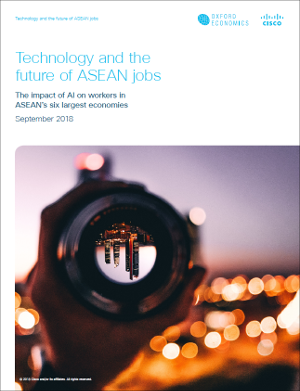Ungated Post | 12 Sep 2018
Technology and the future of ASEAN jobs

Technology will displace 28 million workers in the ASEAN region by 2028, but by boosting real incomes it will generate new demands for workers too. Jobs will evolve, rather than disappear, posing a considerable reskilling challenge to ASEAN workers.
Artificial Intelligence-enabled technologies will deliver substantial productivity gains across all sectors of ASEAN economies over the next decade, resulting in major benefits for businesses and prosperity for the region. However, this will have a significant impact on the labour market as AI-enabled technologies will make many skills sets, and job profiles, redundant.
In a follow up to Oxford Economics’ 2018 collaboration with Cisco, "The AI Paradox: How robots are making jobs more human", we have teamed up with Cisco to better understand the labour implications of Artificial intelligence in the ASEAN region. Which are the jobs that will be displaced by technology over the coming decade? Where will new jobs be created? And what skills challenges will this pose across the region? The report draws on input from a multidisciplinary team of experts to explore how technological change will manifest itself, how the labour market will evolve around it, and what skills shortfalls that will expose.
Our economic consulting team are world leaders in quantitative economic analysis, working with clients around the globe and across sectors to build models, forecast markets and evaluate interventions using state-of-the art techniques. Lead consultants on this project were:
Oxford Economics’ team is expert at applying advanced economictools that provide valuable insights into today’s most pressing business, financial,and policy issues.
To find out more about our capabilities, contact:
EMEA
Sam Moore
+44 (0)207 803 1415
Email
Americas
Hamilton Galloway
+1 (646) 503 3068
Email
Asia
Peter Suomi
+65 6829 7198
Email
Related Services

Post
The Economic Footprint of JLR in the UK
This report examines the economic footprint of JLR in the United Kingdom in 2024. The analysis is conducted both at the national level, as well as on the West Midlands and North West regions, where JLR’s main facilities are located.
Find Out More
Post
Airbnb’s Economic Contribution to APAC in 2024: GDP, Jobs, and Regional Impact
Airbnb's platform connects hosts across Asia Pacific (APAC) with travellers from around the world. Oxford Economics was commissioned by Airbnb to quantify its economic footprint in 10 APAC markets in 2024.
Find Out More
Post
Economic Insights: Airbnb’s Contribution Through the Lens of Oxford Economics
Oxford Economics Australia delivered a tailored economic impact assessment for Airbnb, including GDP contribution modelling, job creation analytics, guest‑spend segmentation, and regional tourism dispersion insights to underpin Airbnb’s stakeholder communications and strategic growth initiatives.
Find Out More